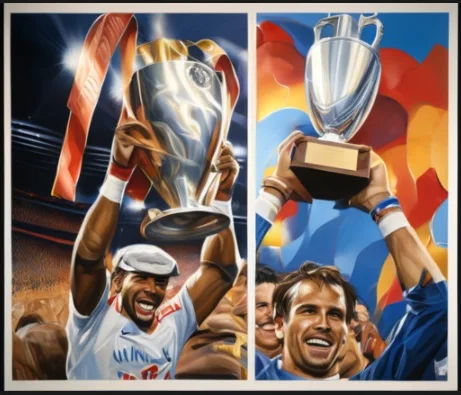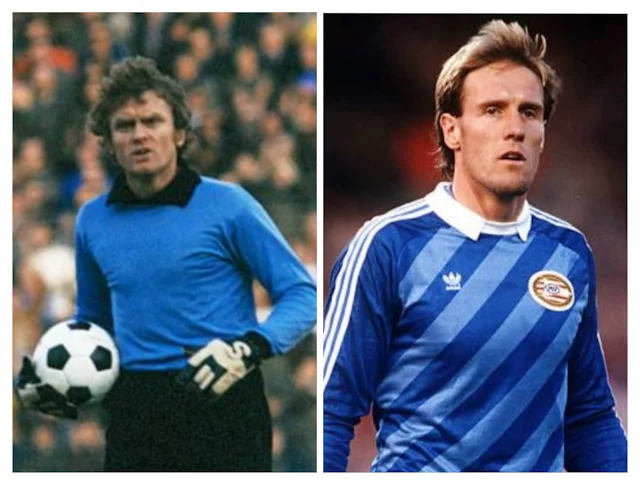Only two goalkeepers managed to play in the UEFA
Champions League and EURO finals in the very same year, but they did not share
the same result.
This year's UEFA EURO Championship, also known as
EURO, is set to be held in Germany next month. It is only a month after the UCL
final at the end of May. Appearing in both finals would definitely be
incredible.
There might have been quite a lot of outfield
players who were able to do so. A number of Three Lions figures made
appearances in both finals after all-English finals in the 2020/21 Champions
League final as EURO 2020 was postponed till the following year due to a global
pandemic. The likes of Mason Mount, Raheem Sterling, Kyle Walker, and two
Italians, Jorginho and Emerson Palmieri, who happened to help Chelsea clinch
their second UCL title, were the examples. Another one would be Cristiano Ronaldo and Antoine Griezmann, who faced off in both the UCL and EURO 2016 finals, with the results in favour of the Portuguese superstar.
Nevertheless, it is very rare to see
shot-stoppers who were fortunate enough to reach the same heights. In fact,
only two names came up: Germany’s Sepp Maier and the Netherlands's Hans Van
Breukelen. Yet, both did not share the same outcome.
Sepp Maier (Bayern Munich and Germany
in 1976)
Maier was the man between the sticks in Bayern
and Germany’s golden generation in the 1970s. He was the mainstay when Die
Roten won three consecutive European Cups from 1974 to 1976, plus when Die
Mannschaft clinched the World Cup in 1974 after lifting their first EURO trophy
in 1972.
In 1976, the Metten-born goalie was already 32
years old. He was not as quick as he used to be. In the European Cup final,
Maier was not exactly in form. He only made one important save while his team
beat St.Etienne 1-0 in the final. He managed to keep clean sheets mostly due to
his teammates’ solid performances at the backline and the French side’s poor
finishing touches. They had two shots rattle the crossbar, which was lucky for
Maier, actually. The Bavarian’s only goal was finally scored by Franz Roth in
the 57th minute through a free kick.
His form in EURO final was not the one to
remember too. Germany reached the final after beating the host Yugoslavia 4-2
in the semifinal after conceding twice first. Yet they could not replicate
their stunning comeback, despite facing the same situation against
Czechoslovakia at the summit. Maier barely made a clinical save throughout the
match. Jan Svelik opened the scoring in the eighth minute before Karol Dobias
extended their lead through his superb long-range shot in the 25th
minute. Fortunately, Germany did not take long to reply, as Dieter Muller
netted a lifeline three minutes later. Their equaliser came late in the second
half, as Bernd Holzenbein’s header found the back of the net as he converted
the corner kick in the 89th minute.
The game had to be decided on penalties. Maier
had his chance to be a hero in the first ever shootout of the European
Championship. Yet he did not succeed, as he failed to deny a single penalty
from Czechoslovakia. On the contrary, Uli Hoeness became the only player who
missed the shot.
History eventually remembered Antonin Panenka,
the last executor. His distinguished penalty cemented the 5-3 victory for his
country. What’s more, it has inspired plenty of top players to attempt it in
modern football. EURO 1976 remained the only time Germany lost on penalties,
and Maier, sadly, contributed to such a defeat too.
Hans Van Breukelen (PSV Eindhoven and the
Netherlands in 1988)
The legendary Dutch goalkeeper had better results
in both finals compared to Maier. Van Breukelen was instrumental in PSV
Eindhoven’s success and De Oranje’s glory in the European Cup and EURO 1988.
Interestingly, he was 32 years old at that time, the same age as Maier in 1976,
but he contributed heavily in those competitions.
In their continental campaign, PSV did not win a
single game from the quarterfinals onwards. They eliminated Bordeaux and Real
Madrid by relying on away goal rules with 1-1 on aggregate (1-1; 0-0). Guus
Hiddink’s side also relied on penalties while beating Benfica in the final,
which was held in Neckarstadion, Stuttgart. Van Breukelen made necessary saves
in the knockout stages, plus a crucial one in the shootout. Benfica’s fifth
executor, Antonio Veloso, failed to hit the target due to his save. It was
PSV’s first and only Champions League title to this day.
A few days later, Van Breukelen once again
appeared in the final. This time it was in the international tournament. The
Netherlands had just humiliated the host and archrival, Germany, in a 2-1 win
in the semifinal. In the summit, they met their first opposition in the opener,
the Soviet Union. Igor Belanov and Co. crushed them 1-0 in the first game.
Fortunately, such a loss did not repeat in the
final, and Van Breukelen contributed heavily to their triumph. He made at least four clinical saves, including a penalty from Igor Belanov in the second half after De Oranje led 2-0 from the skipper, Ruud Gullit, and Marco Van Basten. It
was a night to remember for the Dutch and certainly for the former Nottingham
Forest shot stopper. Such success cemented his status as a legend, with German
soil as his land of fortune.
It will be interesting to see if such can be
repeated this year. Bayern’s Manuel Neuer and PSG’s Gianluigi Donnarumma are
certainly the frontrunners for it. Neuer is the skipper of the host nation in
EURO 2024, whereas Donnarumma is part of the mainstay in Gli Azzurri, the
reigning champions. However, Real Madrid’s Andry Lunin and Borussia Dortmund’s
Gregory Kobel cannot be ruled out either. They might only be the second fiddle
in the national team, but strange things could happen, and they could be
fielded should the first choice be injured or sidelined for poor performance.
Not to mention Thibault Cortois, who still holds the opportunity to be in form
and make appearances in both summits with Los Blancos and Belgium.



Comments
Post a Comment